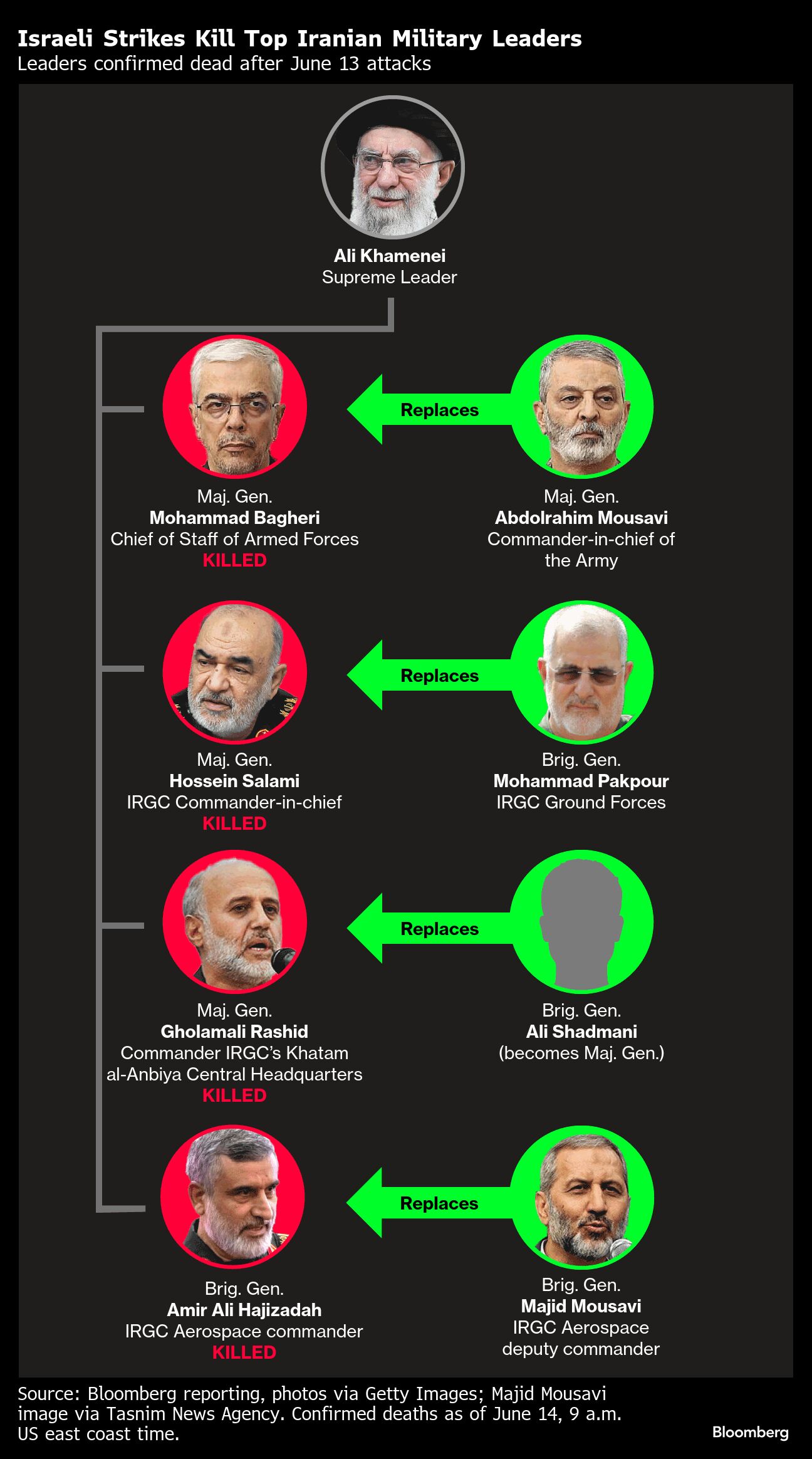
Israel's warplanes kept up attacks on Iranian missile systems, airfields and the Fordow nuclear site following US strikes at the weekend, as debate raged in the country over how long the campaign should continue.
“Israel is striking regime targets with unprecedented force,” Defense Minister Israel Katz said in a statement on Monday, including the internal security headquarters and the infamous Evin Prison for political prisoners. At a news conference on Sunday night, Prime Minister Benjamin Netanyahu declined to be specific on a timeline for ending the war, saying: “Once we achieve the goals, we will not continue beyond what is necessary. But we won't end it prematurely either.”
Before the US joined the battle, Netanyahu declared three goals: eliminate Iran's nuclear program, end its ballistic missile capability and prevent it from sponsoring anti-Israeli militias such as Palestinian group Hamas, Lebanon-based Hezbollah and Yemen's Houthis. For some commentators, those sound like open-ended goals that won't lead to a swift end to a war costing Israel tens of billions of dollars in weapons systems and lost productivity and driving residents daily into bomb shelters.
“We need to say to the American president, ‘Thank you. We'll never forget what you did for us,'” wrote Nahum Barnea, a columnist for the centrist Yedioth Ahronoth newspaper. But Donald Trump now needs to “impose a ceasefire on Iran and us. Not in another two weeks, and not in another month, but now.”
Israel's home command says that in the past week and a half, hundreds of Iranian ballistic missiles have driven some 10,000 Israelis from their damaged homes. That is reason enough to find an off-ramp and declare victory, Barnea and others say, along with concerns of further Iranian retaliation and the prospect of a perpetual war of attrition.
But Caroline Glick, a top adviser to Netanyahu, said Iran's ability to counterattack is precisely the reason Israel won't be hurried.
“They keep attacking Israel, and we need to eliminate their ability to do that,” she said by phone. “No one is standing with a stopwatch saying end it. We have our objectives and we are achieving them. The public gets it. It's not rushing us.”
The fear is that Iran will continue to do what it did Monday — launch highly destructive ballistic missiles, forcing everyone into safe rooms and damaging infrastructure such as electrical facilities. The debate is whether Iran's capacity can be ended militarily or whether it would be better to allow diplomacy to take over.
Some TV panel experts argue that Israel should seek a mutual pause in hostilities after all its military targets in Iran have been hit.
This is possible, they note, in part due to the damage Israel has inflicted on Iran's regional proxies over the past year, particularly Hezbollah and Hamas, both designated terrorist organizations by the US and many other governments.
“This is the time to end the war in Iran, to end the war in Gaza, and to turn inside Israel,” Ehud Olmert, a former Israeli prime minister and critic of Netanyahu, told Bloomberg TV on Monday. It's necessary “to recuperate and to build up again that which was broken in the hearts and minds and spirits of the Israeli people after two years of fighting with Hamas and with the Iranians,” he added.
Others closer to the center of power — including Netanyahu — have floated the idea that Israel's war on Iran could result in regime change, without stating that that's the goal. Many in the region fear what a power vacuum in the country of 90 million people could mean, given the extremism and sectarian violence that followed the Iraq War and the Arab Spring.
“We very much hope that we will succeed in heading up a process that will ultimately lead to Iran continuing to be isolated,” Finance Minister Bezalel Smotrich said in a radio interview. “As a result of this, it can certainly happen that the regime will be destabilized to the point of collapse.”

But, ultimately, many analysts say, the direction of the war is in the hands of Iran's leader Ayatollah Ali Khamenei. He's yet to indicate how the Islamic Republic will respond to the US or plans for about 400 kg of highly enriched uranium that could be turned into bombs and thought to still be in Iranian hands.
On Monday, Iran said the US should await “severe consequences.”
Ehud Yaari, a veteran Israeli commentator on the region, said on Channel 12 that Khamenei can use the uranium as a card at the negotiating table but, ultimately, he's got the weaker hand.
“Khamenei must decide whether to try to resume holding negotiations in the hope that Trump will back down from his demand for total surrender,” he said. Or “to persist in fighting, to suffer more and more, and to reach the moment at which he will agree to hold negotiations under worse conditions.”
Essential Business Intelligence, Continuous LIVE TV, Sharp Market Insights, Practical Personal Finance Advice and Latest Stories — On NDTV Profit.




















